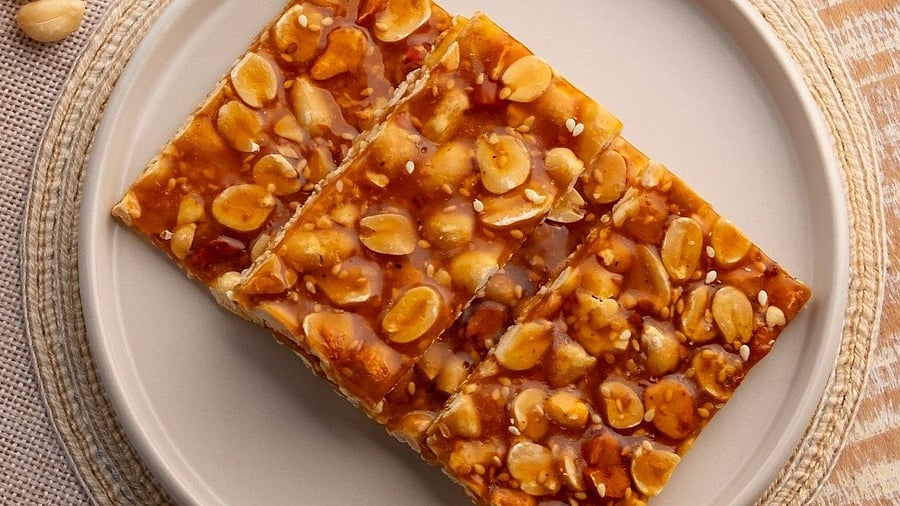
'Chikki,' 'kadle mittai' is a favourite among kids and adults alike. The nutty and crunchy peanut brittle is made by roasting the peanuts and mixing it together in a thick jaggery syrup and then cooling it.
Credit: Special Arrangement
Mysuru: After recent concerns about the government’s decision to distribute spirulina chikki as a nutrition supplement to children residing in the hostels run by the Social Welfare Department, the Central Food Technological Research Institute (CFTRI) has said that chikki is safe to be given to children.
CFTRI Director Sridevi Annapurna Singh said, "The nutritional content, in terms of protein, iron and calcium is high in spirulina chikkis. It was provided to pre-school children as part of a nutrition intervention programme and was found to be safe."
Principal Secretary of Social Welfare P Manivannan asked the concered officials concerned to recheck with CFTRI, following objections by a few NGOs, before inviting tenders for spirulina chikkis to be given to children from the departments hostel. CFTRI sent its response clarifying that it is safe.
Speaking to DH, Manivannan said, "We want to be 100 per cent sure about the safety of our children."
According to officials from the Social Welfare Department, the state government allotted an additional Rs 100 per month for each child living in the hostel run by the department, in last year's budget.
Earlier they gave three eggs per week, since April 1, 2024, the government started giving seven eggs a week with the extra amount to provide additional nutrition.
In a letter dated September 24, 2024, the department approached CFTRI for a few nutrition supplements.
On October 8, 2024, considering the menu currently provided, the CFTRI recommended spirulina chikki (20 gm comprising 110 kCal energy, 3.5g protein, 1.5mg iron, costing Rs 7 per serving), millet-based nutritional products, including Ragi laddu (20 gm comprising 92 kCal energy, 2.2 protein, 3.3 gm fat, 33 mg calcium, costing Rs 8), energy food with new formulation (50 gm with one tsp ghee comprising 225 kCal energy, 7.5 g protein, costing Rs 9 per serving), officials said.
According to the officials of FSSAI, spirulina is approved under FSSAI food product category 13 (food stuffs intended for particular nutritional uses).
Aashitosh A Inamdar (PhD-Food Science), head of Technology Transfer & Business Development Department, CFTRI explained that spirulina, a blue-green alga (cyanobacterium), has been extensively studied and is now widely used throughout the world as a health food and a dietary supplement.
Spirulina is a concentrated source of protein, vitamins, especially B12, Provitamin A (β carotene), and Vitamin E, minerals, especially iron. It is also rich in gamma-linolenic acid (GLA), and an omega-3 fatty acid. It is an approved ingredient for food, by FSSAI.
CSIR-CFTRI has developed the technology for the production of nutri-chikki with added spirulina. The nutrient composition of groundnut chikki with spirulina per 100 grams includes 470 - 495K Cal energy, 12 -14g protein, 20 -22g Fat, 58g – 60g carbohydrates, 5 - 6 mg iron, and 50 - 60mg calcium."
CSIR-CFTRI has even given specifications for the procurement of spirulina as a starting raw material/fortificant and for the safe production of the spirulina chikki which the manufacturers must follow.
M Komala, chairperson, of the Department of Studies in Food Science and Nutrition, University of Mysore, Manasagangotri, Mysuru, said "The Department of Food and Drug Administration (FDA) has given GRAS (Generally Recognized as Safe) certification for spirulina consumption and allows it to be consumed as a food supplement."
She added, "As per research, 2 gm of spirulina supplementation into chikki for children is well tolerated. Spirulina chikki is beneficial for preventing anemia in children, particularly Iron (Fe) deficiency anemia. Spirulina is a rich source of iron, a crucial mineral for producing RBC (Red Blood Cells) and iron absorption in the body."
"It is rich in antioxidants which protect the body against damage from free radicals. Spirulina chikki can help to reduce the risk of heart diseases and strokes, as it reduces blood pressure and inflammation. Further, it improves blood lipid profile," Komala said.
Aahaara Namma Hakku - an NGO - had given a memorandum to Manivannan, objecting to giving spirulina chikki to children.
The letter stated, "Spirulina is an algae that grows in lakes and ponds. If the water contains heavy metals, such as mercury or lead, the spirulina algae absorb them. When harvested and dried, the metals remain inside the supplement.
The World Health Organisation says cyanotoxins and heavy metal toxicity can cause irreversible nerve, bone, and tissue damage. An earlier decision, in 2016, by the Karnataka government to feed children with spirulina supplements, in collaboration with corporates, was strongly condemned and revoked."